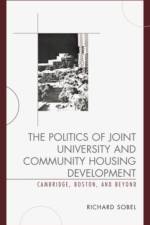- Cambridge, Boston, and Beyond
von Richard Sobel
155,00 €
The Politics of Joint University and Community Housing Development: Cambridge, Boston, and Beyond informs and encourages the understanding and creation of community/university housing. It reveals the political and technical dynamics of joint housing development involving both communities and universities. Community/university housing projects have been built in several cities and planned in others.Since Cambridge, Masschusetts, home of Harvard and MIT, contains outstanding examples of community/university housing, the book focuses on the projects there since the 1960s. It also discusses a major project in Mission Hill near Harvard Medical School in Boston, along with brief examinations of a number of other projects. Through the Cambridge and Boston cases, the author explores the historical, political, and economic reasons for developing community housing. There, residents asked the universities to help solve the city housing problems to which the institutions had contributed. Since community housing involved a process, as well as a result in describing how the housing was built, the book focuses on the role of community participation in the development process.The study contributes to the understanding of the issues in several ways. First, two people well acquainted with community/university housing and politics introduce the study with insightful forewords. Second, the study provides details of the development process that will be useful to other community/university groups. Third, it explores university responsibility, rhetoric versus reality, and the educational values of community housing participation. Fifth, the lessons and suggestions provide insights and inspiration for others. Finally, the epilogue explains the development of the study.This study will be particularly helpful for other cities and university/communities encountering housing problems. The features and information here will interest a wide range of community, university, and other urban groups. The issues discussed will become increasingly relevant as more people move into attractive areas near universities. It is also pertinent to institutions like hospitals that also have community and housing problems, and to civic groups that can help solve a range of housing problems. This book explains the politics of community/university housing development in ways that encourage others to address and solve similar problems.




